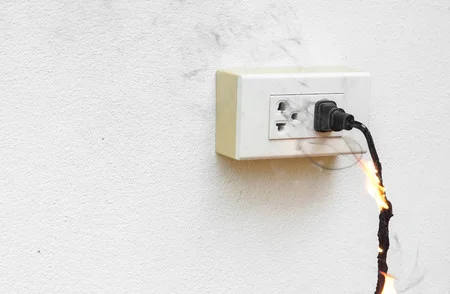This article is your guide to answering the question of, what is a power surge. We’ll answer the fundamental question, “What is a power surge?” and explore the telltale signs, common causes, and crucial steps you can take to safeguard your valuable electronic devices and appliances from potential harm.Whether you’re a tech enthusiast or concerned about protecting your investments, understanding electric surges is paramount in today’s electrically charged world.
Here at The Energy Professor, we want to give you the information you need to not only save money on your energy bill but to also become more energy efficient. We hope find this post helpful and make it easier for you to know what a power surge is for 2024. Be sure to also check out our one-of-a-kind energy savings calculator!
The Energy Professor Electricity Rate Check Tool
What is a Power Surge?
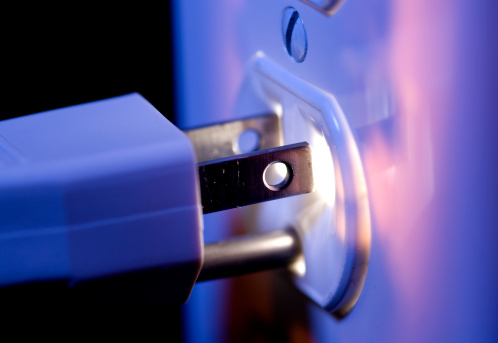
A power surge, also known as an electrical surge, is precisely what its name suggests—a surge of electrical power that exceeds normal levels. It occurs when an excessive amount of voltage flows through electrical wires and into connected devices. Although these surges are typically short-lived, lasting only a few microseconds, their impact can be considerable. They have the potential to cause significant damage to electronic devices and appliances connected to the circuit. The consequences of a power surge can range from minor glitches and errors to permanent, costly damage that necessitates repair or replacement. In severe cases, electrical surges can even pose a fire hazard. Therefore, understanding what a power surge is, how it occurs, and how to protect against it is crucial.
Related Post: What is a Rolling Blackout?
What Causes a Power Surge in a House?
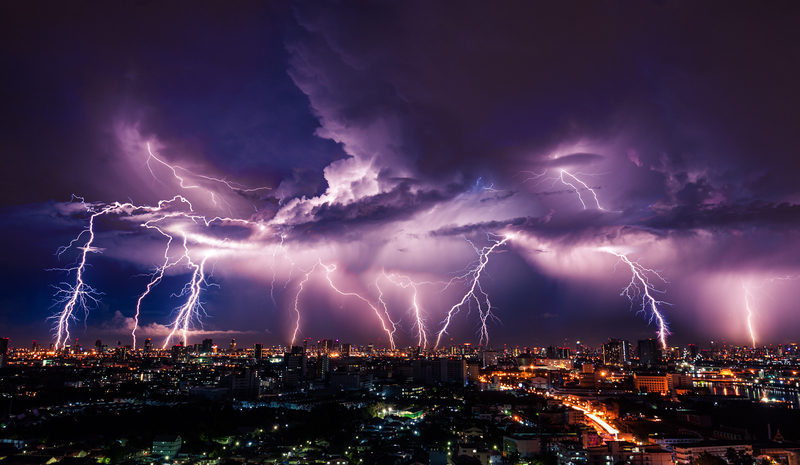
Power surges in a house can originate from several sources. One frequent culprit is the power grid switching performed by your utility company, which has the potential to generate voltage spikes. Although rare, lightning strikes can unleash massive power surges. Additionally, overloading electrical outlets or enduring power outages can result in surges when power is restored. Lastly, the presence of faulty wiring, including issues like short circuits and overloaded circuits, can be a leading cause of surges. This underscores the significance of regular inspections conducted by a qualified electrician to ensure the safety of your home’s electrical system..
Related post: Can a Power Surge Damage Appliances?
What are the Top Power Surge Causes?

Curious about the most common power surge culprits? Below, we’ve outlined the primary causes of power surges:
#1 – Power Grid Switching
The cause of a power surge may originate from your utility company. The utility company may need to switch the supply of power to another source or temporarily interrupt the flow of power to its customers to aid in clearing a fault in the system. This is often the case in the event of a fallen tree limb or small animal causing a fault on the line. This switch may result in a voltage spike and power surge in your home.
#2 – Lightning
In the rare and unpredictable event that lightning strikes your home’s electrical system, it can unleash a devastating power surge. When lightning makes contact with your electrical infrastructure, it brings forth an overwhelming current that surges through your circuits, wreaking havoc in its path. This sudden influx of electrical energy can lead to severe damage to your electronic devices and appliances, even if it lasts only a fraction of a second.
This unique source of power surges exemplifies the challenges we face as homeowners since we have no control over natural phenomena like lightning strikes. It serves as a reminder of the importance of understanding the power surge definition and taking precautionary measures to protect your valuable equipment from the potential wrath of these uncontrollable electrical events. While we can’t control lightning, we can certainly take steps to safeguard our homes against its unexpected and powerful surges.
#3 – Electrical Overload
One of the most common power surge causes is electrical overload. Do you have too many appliances plugged into an outlet? Do you have extension cords all over your home? This is one of the leading causes of a power surge. Having too many appliances plugged in at one time can cause a massive spike in current due to the excessive power being drawn.
#4 – Power Outage
Power outages and blackouts can occur for a multitude of reasons, leaving us temporarily without electricity. However, when it comes to safeguarding your electronic devices and appliances from potential harm, it’s crucial to pay special attention during the next blackout. Here’s why: when the electrical power is restored after an outage, there’s a potential for an electrical power surge. This sudden and pronounced surge in current can send a wave of electrical energy through your circuits, potentially causing significant damage to any previously unpowered appliances. Understanding this phenomenon is essential in protecting your home from the unexpected consequences of power surging in-house during post-blackout moments.
#5 – Wiring
If you have to ask yourself the question “Why does my power keep surging” faulty wiring may be the reason. It is important to have an electrician inspect and repair any faulty wiring that may be in your home. Faulty wiring can cause a power surge in several ways:
- Short circuits: A short circuit occurs when two or more wires in an electrical circuit touch each other, causing a sudden increase in current flow. This sudden increase in current can cause a power surge.
- Ground faults: A ground fault occurs when a wire in an electrical circuit comes into contact with a ground surface, such as a metal pipe or the ground itself. This can cause a sudden increase in current flow, leading to a power surge.
- Overloaded circuits: Faulty wiring can cause circuits to become overloaded, which can lead to a power surge. This occurs when too many appliances or devices are connected to a circuit, causing the current to increase beyond the capacity of the wiring.
- Voltage spikes: Faulty wiring can also cause voltage spikes, which occur when the voltage in an electrical circuit suddenly increases. This can happen if the wiring is damaged or if there is a problem with the electrical supply.
Related Post: Blackout vs. Brownout
What are the Signs of a Power Surge in Home?
Now that we have discussed what are power surges and what causes power surges, let’s discuss signs. Power surges can cause significant damage to the electronics and appliances in your home, which can be both costly and frustrating. Knowing the signs of a power surge can help you take action to protect your home and avoid potential damage. Signs of a power surge include flickering lights, burnt or damaged outlets, tripped circuit breakers, malfunctioning electronics, and unexplained damage
#1 – Flickering Lights
One of the most common signs of a power surge is flickering lights. If you notice that your lights are flickering or dimming for no apparent reason, it could be a sign that your electrical system is experiencing voltage fluctuations. While this could be caused by a variety of issues, such as a damaged electrical service line, it is often a sign of a power surge.
#2 – Burnt or Damaged Outlets
If you notice that your electrical outlets appear burnt, or damaged or see smoke coming from the outlet, it could be a sign of a power surge. Power surges can cause electrical outlets to overheat, leading to damage or discoloration. You may also notice a power surge burning smell, this can be a serious hazard and should be addressed immediately by a qualified electrician.
#3 – Tripped Circuit Breakers
If your circuit breaker trips frequently, it could be a sign that your electrical system is experiencing power surges. Circuit breakers are designed to trip when the electrical current exceeds a safe level, which can happen during a power surge.
#4 – Malfunctioning Electronics
Have you wondered “Why are all my appliances breaking?” If your electronic devices or appliances are suddenly malfunctioning or failing, it could be a sign of a power surge. Power surges can damage sensitive electronics and cause them to fail or malfunction. If you notice that your electronics are behaving erratically or not working at all, it is important to have your electrical system inspected by a qualified electrician.
#5 – Unexplained Damage
If you notice unexplained damage to your electronics, such as cracks or scratches, it could be a sign of a power surge. Power surges can cause physical damage to electronics and appliances, which may not be immediately apparent.
Knowing the signs of a power surge can help you take action to protect your home and avoid potential damage. If you notice any of these signs, you may be wondering “How to fix a power surge?” It is important to have your electrical system inspected by a qualified electrician. They can identify the source of the power surge and recommend appropriate measures to protect your home.
Related Post: Why is my Electric Bill so High?
Are Power Surges Common?
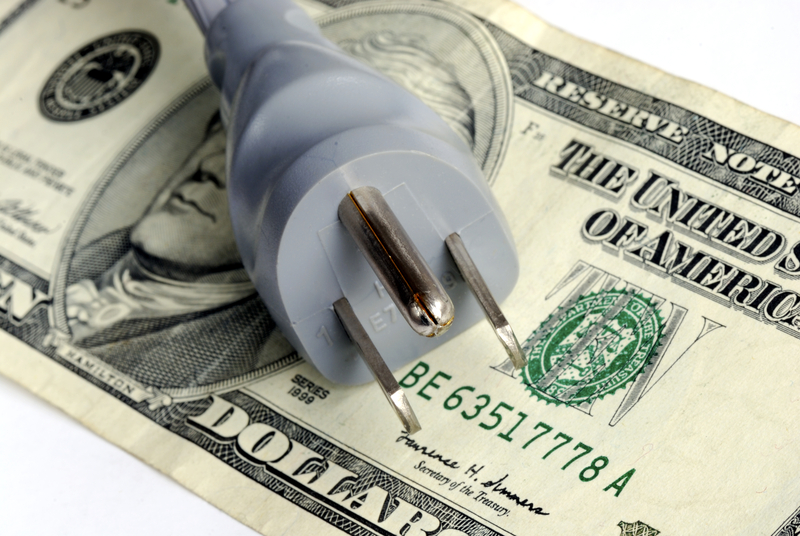
Power surges can occur at any time and can be caused by a variety of factors, such as lightning strikes, faulty wiring, and power outages. While power surges are not uncommon, their frequency can vary depending on several factors, such as the location of your home and the quality of your electrical system.
For example, if you live in an area that experiences frequent lightning strikes or power outages, you may be more likely to experience power surges. Additionally, if your electrical system is outdated or poorly maintained, it may be more susceptible to power surges. While an electric surge can be frustrating and potentially costly, there are steps you can take to protect your home, such as installing surge protectors and having your electrical system inspected by a qualified electrician.
How Often Do Power Surges Happen?
Well, the truth is that power surges occur with surprising regularity and may take place multiple times within a single day. These frequent surges, while often on a smaller scale, can easily go unnoticed. They might not create dramatic, immediate disruptions, making it crucial to remain vigilant.
Even though the damage from each surge might be minor, the cumulative effect can be significant over time, potentially leading to power surge damage that harms your appliances. This is why it’s essential to keep the prevention tips we discussed above in mind, as they play a pivotal role in shielding your valuable devices from the potentially destructive impact of recurring power surges.
Can a bad breaker cause a power surge?
No, a bad breaker itself cannot cause a power surge. Power surges typically occur due to sudden increases in electrical voltage within your home’s electrical system. These surges can result from various factors such as lightning strikes, power grid switching, electrical overload, or power outages.
Related Post: Why is it Important to Conserve Energy?
Power Surges in House FAQ
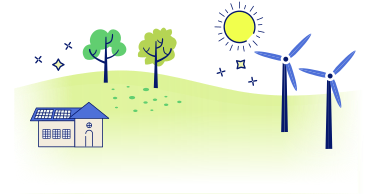
Q: What is a power surge vs. power outage?
A: A power outage is a loss of power while a power surge increases the voltage. A power surge may cause electronics or appliances to temporarily turn on and off while a power outage may cause appliances and electronics to turn off as well but for a longer period
Q: Can power surges damage appliances?
A: If your electronic devices or appliances are suddenly malfunctioning or failing, it could be a sign of a power surge. Power surges can damage sensitive electronics and cause them to fail or malfunction.
Q: What to do after a power surge?
A: After a power surge in your home, you will want to reset, unplug, and re-power all electronic devices. Assess your appliances and outlets for any damages and reset the circuit breaker if your power is still out.
Do you Need Cheaper Electricity?
If you’ve taken the time to understand the information on your bill and discovered you’re paying more than you’d like for your electricity, have you looked around for a cheaper deal? The Energy Professor has a wealth of information on ways to save on your utilities, including details of top deals that could significantly reduce your monthly or quarterly electricity bills.
We hope you found this article helpful! If you are looking for ways to increase energy efficiency and sustainability in your home be sure to take a look at all of the latest renewable energy options in your area. The Energy Professor helps residential and small business owners find qualified energy suppliers in New York, New Jersey, Pennsylvania, Texas, Ohio, Maryland, Illinois, and Massachusetts

